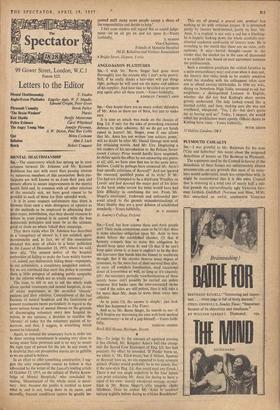Letters to the Editor
T. Yeadon Kingsley Ands, W. F. Mandle, Edmund Crispin, Peter Green Derek Parker Pluenix NeriIle Masterman Carol Whitehead Jennifer Plowman, A. W. Dicker, Paul Ries Collin Helen Cochrane Alan J. Lack Robert Conquest Mental Healthmanship Anglo-Saxon Platitudes Plymouth 'Casualty 'The Brain-Washers' Keir Hardie Police Evidence The Angry Young Man Qat Inflation Botch MENTAL HEALTHMANSHIP
SIR,—The controversy which has sprung up in your columns between Dr. Johnson and Mr. Kenneth Robinson has met with more than passing interest by numerous members of this association. Both par- ticipants are well known to us from their past and present efforts to secure improvements in the mental health field and, in common with all other relatives of the mentally sick, we have good reason to be grateful to each of them for their splendid work.
It is in some respects unfortunate that there is between them such a wide divergence of opinion as do the methods to be employed in advancing their joint cause; nevertheless, that they should recourse to debate in your journal is in accord with the best democratic principles and must be to the ultimate good of those on whose behalf they campaign. That there exists what Dr. Johnson has described as a 'conspiracy of silence' is, I am satisfied, quite Incontestable and, in fact, we of this association attacked this state of affairs in a letter published in the Lancet of December 24, 1955, where we said, inter alia, 'The present policy of the hospital authorities of failing to make the facts widely known —if, indeed, not deliberately hiding them—represents, in, our submission, a completely, misguided outlook, for we are convinced that until this policy is reversed there is little prospect of enlisting public sympathy for the reforms which are so vitally necessary.'
The issue, to tell or not to tell the whole truth about mental treatments and mental hospitals, is one of major importance to the so-called 'chronic' patients and their relatives. Concealment of the bad features of mental hospitals and the limitationg of present treatments (more particularly in regard to the more serious forms of mental illness) on the grounds of discouraging voluntary entry into hospital in- volves, in my opinion, a decision to sacrifice the 'chronic' of today for the voluntary patient of to- morrow, and that, I suggest, is something which cannot be tolerated.
Again, to conceal the unsavoury facts in order not to deter nursing recruitment is coming very close to acting under false pretences and is no way to secure the right type of person for the job. In any event, it is doubtful that our prospective nurses are as gullible as we are asked to believe.
In an effort to offer something constructive, I sug- gest the only responsible course to follow is that advocated by the writer of the Lancet's leading article of October 15, 1955, on the subject of 'Public Know- ledge of Mental Hospitals,' who concluded by stating, 'Illumination of the whole scene is neces- sary: first, because the public is entitled to know what is, and is not, being done in its name, and secondly, because conditions cannot be greatly im-
proved until many more people accept a share of the responsibility and decide to help'
I feel your readers will regard this as sound judge- ment—let us all get on and act upon it.—Yours faithfully, T. YEADON Vice-Chairman, Friends of Menston Hospital (M.H. Relatives and Visitors Association) 4 Bright Street, Skipton, Yorks


































 Previous page
Previous page